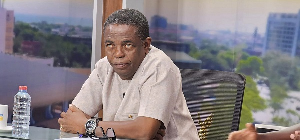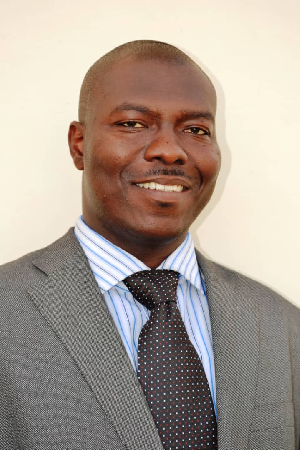Opinions of Thursday, 12 June 2014
Columnist: Alhaji Alhasan Abdulai
‘Winner takes all’ governance; not good for Ghana
We have no choice but to applaud the framers of the 4th republican constitution for helping to steer the nation from undemocratic, to constitutional and democratic rule since 1992. When the constitution came into force, we least expected that 20 years down the line the major part of the constitution, the presidency would pose a problem to the country; but that is the case now.
Fortunately, many individuals and organizations have discovered that the presidential system that gives absolute power to the president is problematic. It does not give room for consensus building as required by our cultures and traditions as a people. Parliament where the presidency has extended powers under the constitution continuously finds it difficult to exercise oversight role over the executive as expected. Although those things that unite the people of Ghana like our customs, religion and the like are more than those that divide us the current constitutional leadership arrangement seems to be a source of division in Ghana.
All those who contest for election against the president and their political parties have no say in the country’s leadership as soon as a president is elected. The leaders of the opposition parties have no place in parliament to work with the president as happen in the Westminster Style governance. Therefore as soon as the president is sworn into office he possibly becomes an enemy (not opponent) of all those defeated at polls in the presidential election. Because the power of the president is absolute, he conversely has the power to be able run the affairs of government with no fear of being ruffled by opposition throughout the four years duration. We are only lucky to have presidents with listening ears; otherwise worse things would have happened to opponents of governments under 1992 constitution.
The current constitutional arrangement seems to be treading on ‘bumpy roads’ that need sorting out quickly. Many organizations and individuals are calling for amendment to reduce the powers of the president under the 1992 constitution.
The constitution has been undergoing reviews especially under late President John Mills when a major review occurred. Recommendations made in the review have received a government white paper. Since the review is yet to be put before the people and parliament for approval, we need to do something about some portions of it. Many people are looking for the opportunity to have a look at the constitution again especially with regard to the powers of the president.
The major problem we are grappling with is the ‘winner takes all’ character of the important part of the constitution, the presidency, which is generally becoming a matter of concern.
Some personalities like Dr Papa Kwasi Nduom, leader of the Progressive People’s Party have cried out against it. The Minority Leader in Parliament, Hon Osei Kyei Mensah Bonsu recently had occasion to point out the danger in us maintaining the current presidential arrangement. It is therefore appropriate when for some top civil society organizations like the Institute of Economic Affairs, and Institute of Democratic Governance to also throw their weights behind efforts to deal with the monstrous ‘winners takes all’ governance in Ghana.
The President, John Dramani Mahama being a beneficiary of the current executive system, had occasion to consider the ‘winner takes all’ governance as not good enough system.He said it as it is. Yes, he might have ‘spoken his mind’ to help chart a new course for us to guard against ‘abuse of office’ in the future.
The current president has experienced leadership at all levels of government in Ghana as Member of Parliament, Deputy Minister, Minister, Vice President and now President.
He, like many other people, have come to realize the extent to which the presidency has been overloaded with state responsibilities. He made the clarion call when he met and dinned with a number of senior citizens as part of the 53rd anniversary of our republican status in Accra.
He was soliciting help from them to advice on how the nation can swim out of what is considered ‘troubled waters’. He is right in this case.
SOLUTION
The solution to this problem is simple. We need to ‘seize the bull by the horns’ by dismantling the hybrid system of governance that combines the Westminster and Presidential American Governance that concentrates power in the hands of the president’ making him a king and not a servant of the state as expected.
So far, we’ve had four presidents (J.J Rawlings, J A Kufuor, late J E A Mills and J D Mahama) since 1992 and each of them wielded too much power. They worked through their aides some of who might have misrepresented the president in their discharge of duties. The presidents were elected to the presidency that has power to choose the majority of ministers from parliament; a move that has the tendency to weaken considerably the oversight power of the legislature over the executive arm of government.
The president has to choose all district and municipal chief executives and members of boards of all government establishments. His power to dismiss and reshuffle his appointees cannot be challenged or queried. Governance under this constitution is so centralized that all bills sent to parliament has to emanate from the presidency. Under this arrangement, decentralization has not been possible since most political decisions for running the district and regional assemblies in the country is often influenced by the central authority in Accra.
PARLIAMENTARY SYSTEM
In contrast to the parliamentary governance as in Great Britain, other commonwealth nations provide that leadership of the nation emanates from parliament with a Prime Minister chosen from the majority political party in parliament or parties in coalition.
CEREMONIAL PRESIDENT
The powers of such a leader is shared with a ceremonial president chosen to receive visitors of state, letters of credence, sign bills into laws and review parades during celebrations as done in advanced democracies.
The activities of a Prime Minister are often in constant review in parliament to determine whether he could end his term or be impeached in a vote of no confidence. Under this arrangement, the Prime Minister is expected to fight for a seat in parliament like all leaders and members of the opposition. Therefore, he is himself a member of parliament and only ‘primus inter pares’. All his ministers would be appointed in parliament.
This is the constitutional arrangement suitable for an emerging democracy like Ghana. This was experienced in the first three years of the first government of Ghana when Dr Kwame Nkrumah became leader of government business and later as Prime Minister with the queen of England as head of state represented by a governor general and in the Second Republic with Dr Busia as Prime Minister and late Edward Akufo Addo as President.
We need to consider going back to this arrangement which we began with attaining independence in 1957 till 1960 when we changed over to a republican status with an executive presidency. When we do that, all leaders of the opposition capable of winning votes could also enter parliament. Under such an arrangement, people like Nana Akufo Addo, Dr Paa Kwesi Nduom, Dr Abu Sakara would have been in parliament to contribute directly in national development.
Some independent candidates could also find their way to parliament to meaningfully contribute to nation building. There would be no credible leader who would remain outside of parliament. They would work together with the ruling class in parliament.
If this arrangement is accepted nationally, all government appointees to districts and municipal assemblies would also be elected to office and would answer to their ministers and their district assemblies. Members of boards would be chosen by the Prime Minister in consultation with his or her colleagues in parliament as well as the Council of State.
Therefore under this arrangement, there would be no ‘winner takes all’ like the current arrangement where power is vested in one individual and his close associates operating and exerting power far apart from the people’s representatives.
By Alhaji Alhasan Abdulai (Executive Director)
eanfoworld for sustainable development
P.O BOX 17070 PHONE 233 244370345/ 233264370345 /233208844791
eanfoworld@yahoo.com/abdulai.alhasan@gmail.com












